新概念英语二册超详教案讲义笔记Lesson 59 In or out? 进来还是出去?
文档属性
| 名称 | 新概念英语二册超详教案讲义笔记Lesson 59 In or out? 进来还是出去? | 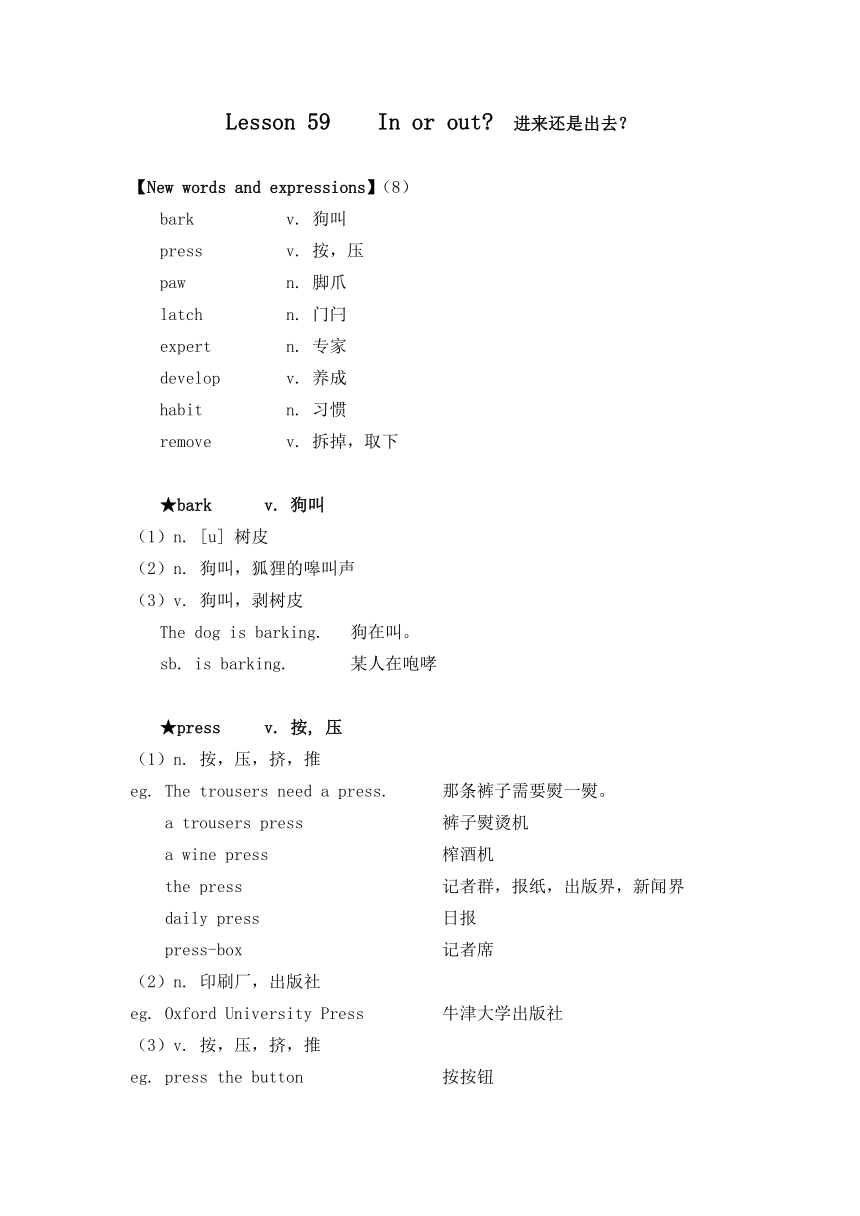 | |
| 格式 | docx | ||
| 文件大小 | 32.5KB | ||
| 资源类型 | 教案 | ||
| 版本资源 | 新概念英语 | ||
| 科目 | 英语 | ||
| 更新时间 | 2023-09-26 09:06:49 | ||
图片预览

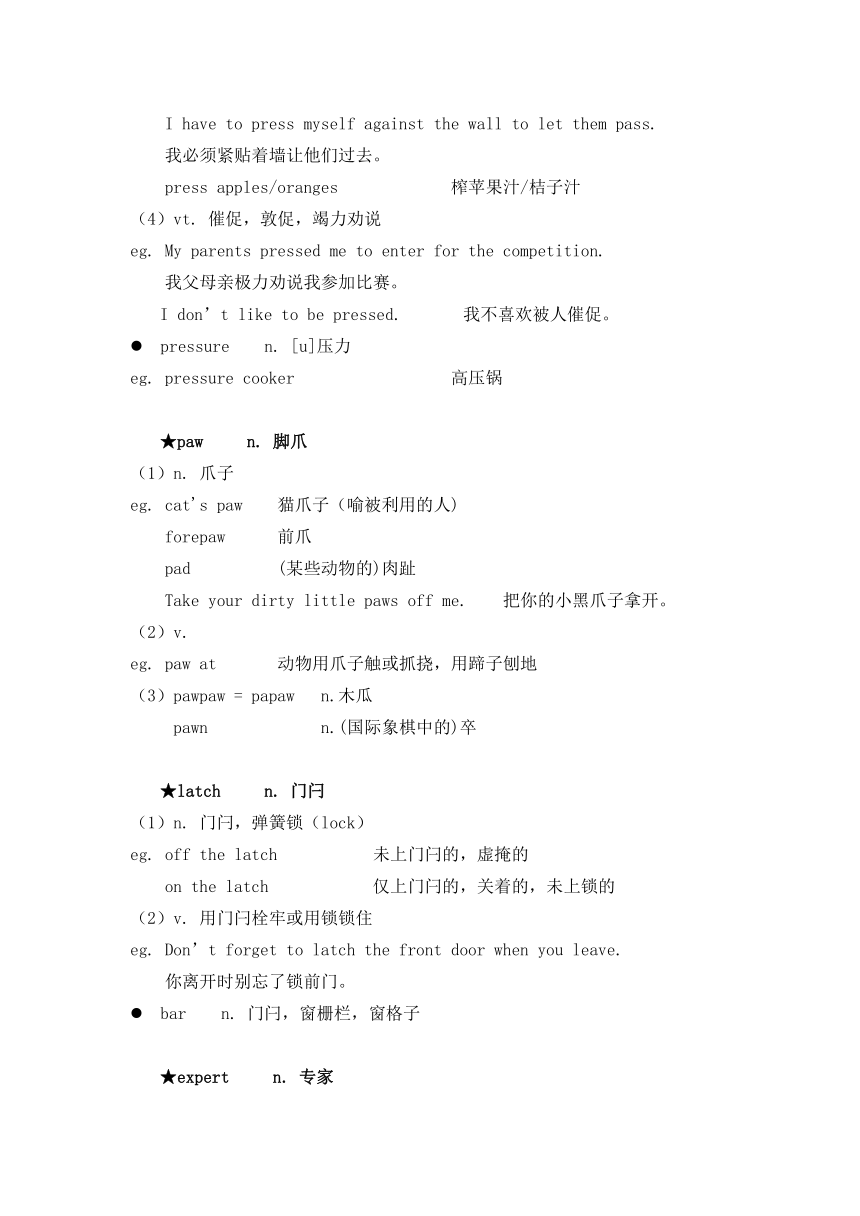
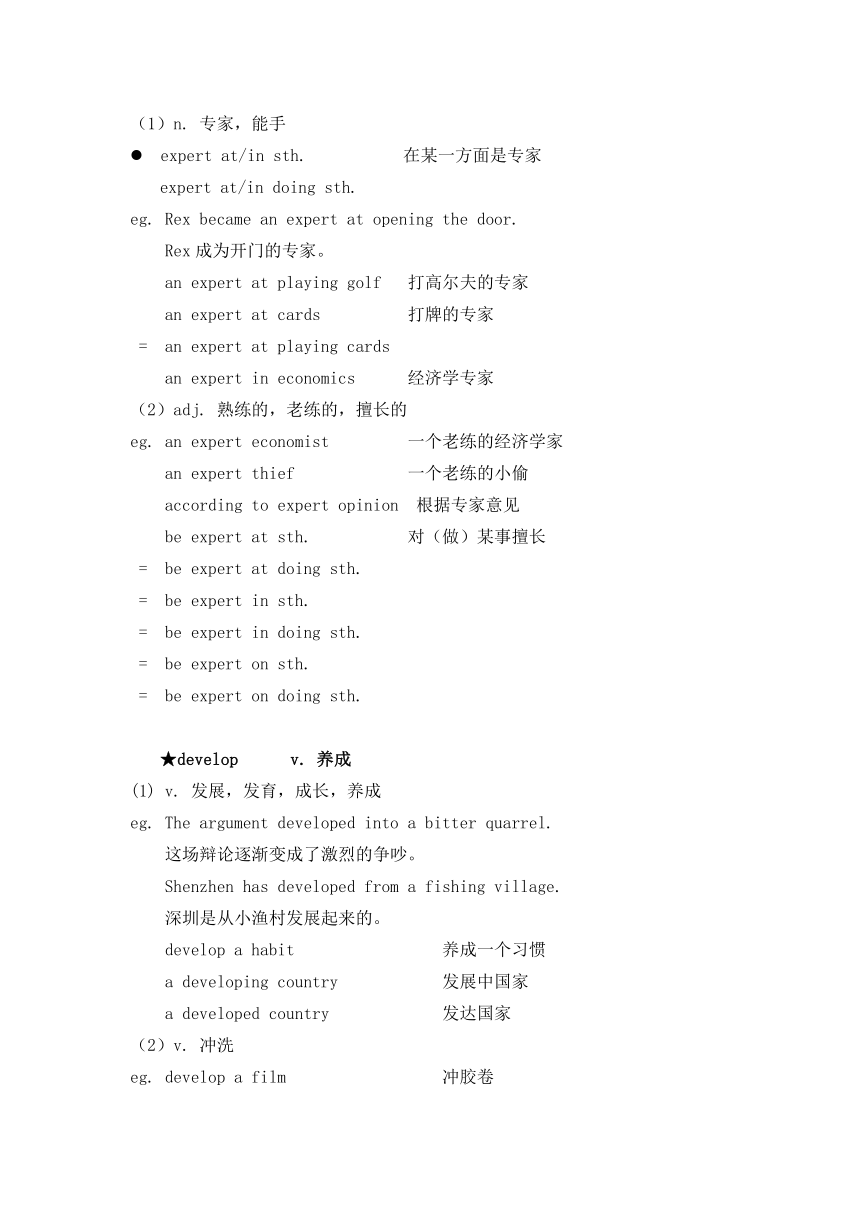
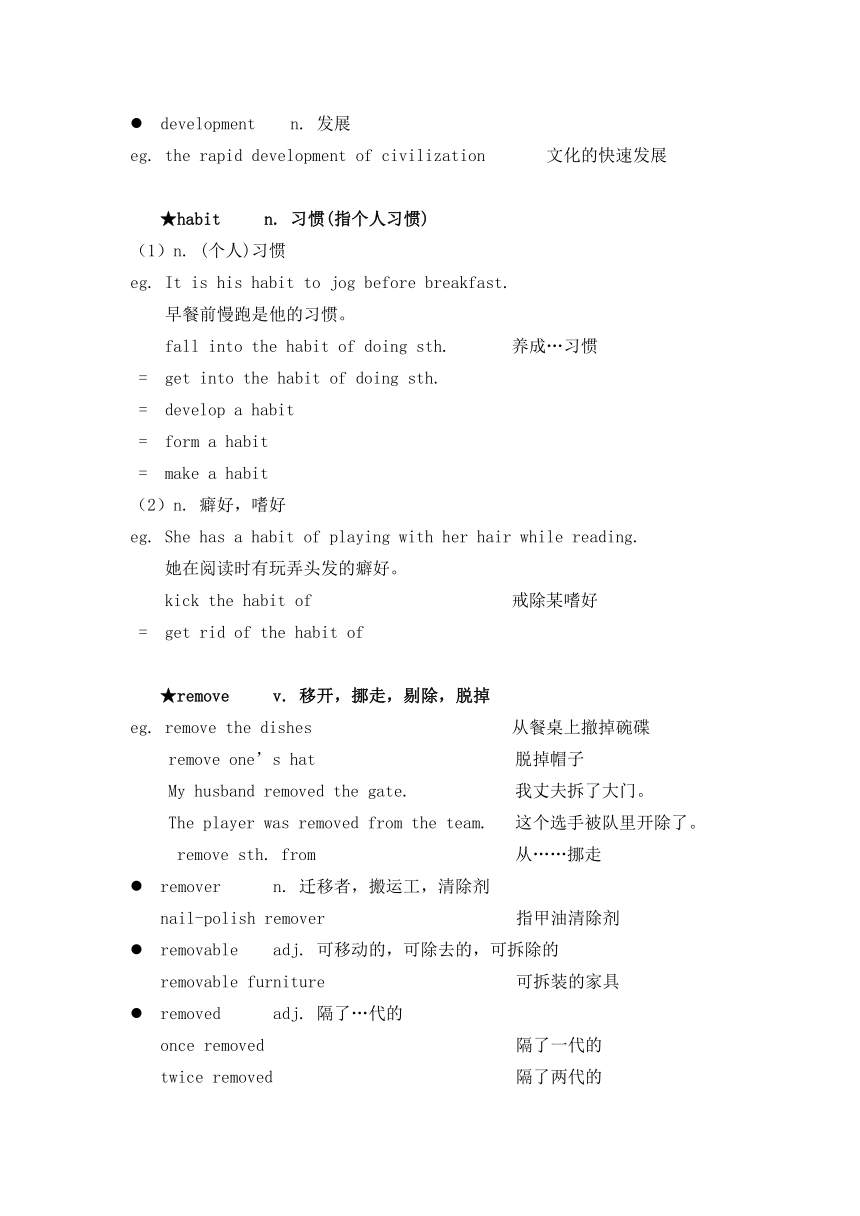
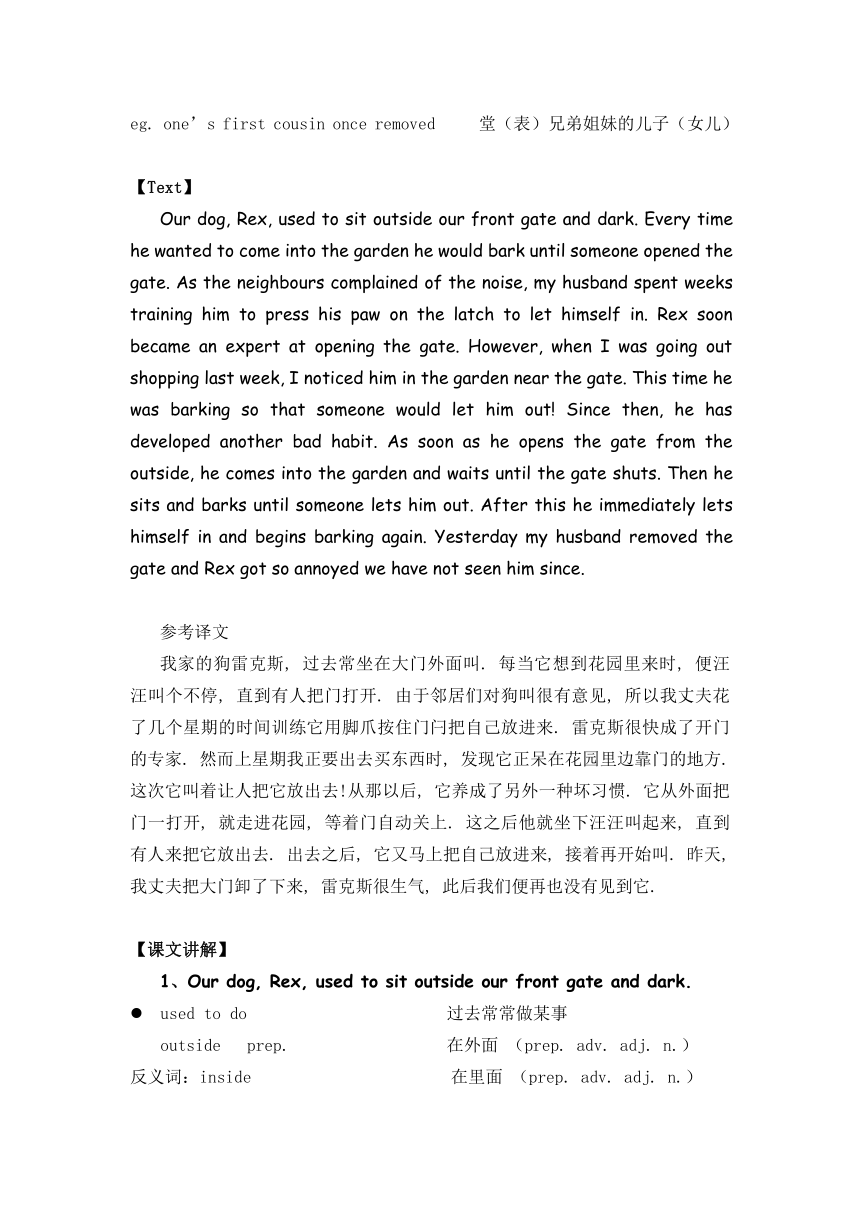
文档简介
Lesson 59 In or out 进来还是出去?
【New words and expressions】(8)
bark v. 狗叫
press v. 按,压
paw n. 脚爪
latch n. 门闩
expert n. 专家
develop v. 养成
habit n. 习惯
remove v. 拆掉,取下
★bark v. 狗叫
(1)n. [u] 树皮
(2)n. 狗叫,狐狸的嗥叫声
(3)v. 狗叫,剥树皮
The dog is barking. 狗在叫。
sb. is barking. 某人在咆哮
★press v. 按, 压
(1)n. 按,压,挤,推
eg. The trousers need a press. 那条裤子需要熨一熨。
a trousers press 裤子熨烫机
a wine press 榨酒机
the press 记者群,报纸,出版界,新闻界
daily press 日报
press-box 记者席
(2)n. 印刷厂,出版社
eg. Oxford University Press 牛津大学出版社
(3)v. 按,压,挤,推
eg. press the button 按按钮
I have to press myself against the wall to let them pass.
我必须紧贴着墙让他们过去。
press apples/oranges 榨苹果汁/桔子汁
(4)vt. 催促,敦促,竭力劝说
eg. My parents pressed me to enter for the competition.
我父母亲极力劝说我参加比赛。
I don’t like to be pressed. 我不喜欢被人催促。
pressure n. [u]压力
eg. pressure cooker 高压锅
★paw n. 脚爪
(1)n. 爪子
eg. cat's paw 猫爪子(喻被利用的人)
forepaw 前爪
pad (某些动物的)肉趾
Take your dirty little paws off me. 把你的小黑爪子拿开。
(2)v.
eg. paw at 动物用爪子触或抓挠,用蹄子刨地
(3)pawpaw = papaw n.木瓜
pawn n.(国际象棋中的)卒
★latch n. 门闩
(1)n. 门闩,弹簧锁(lock)
eg. off the latch 未上门闩的,虚掩的
on the latch 仅上门闩的,关着的,未上锁的
(2)v. 用门闩栓牢或用锁锁住
eg. Don’t forget to latch the front door when you leave.
你离开时别忘了锁前门。
bar n. 门闩,窗栅栏,窗格子
★expert n. 专家
(1)n. 专家,能手
expert at/in sth. 在某一方面是专家
expert at/in doing sth.
eg. Rex became an expert at opening the door.
Rex成为开门的专家。
an expert at playing golf 打高尔夫的专家
an expert at cards 打牌的专家
= an expert at playing cards
an expert in economics 经济学专家
(2)adj. 熟练的,老练的,擅长的
eg. an expert economist 一个老练的经济学家
an expert thief 一个老练的小偷
according to expert opinion 根据专家意见
be expert at sth. 对(做)某事擅长
= be expert at doing sth.
= be expert in sth.
= be expert in doing sth.
= be expert on sth.
= be expert on doing sth.
★develop v. 养成
(1) v. 发展,发育,成长,养成
eg. The argument developed into a bitter quarrel.
这场辩论逐渐变成了激烈的争吵。
Shenzhen has developed from a fishing village.
深圳是从小渔村发展起来的。
develop a habit 养成一个习惯
a developing country 发展中国家
a developed country 发达国家
(2)v. 冲洗
eg. develop a film 冲胶卷
development n. 发展
eg. the rapid development of civilization 文化的快速发展
★habit n. 习惯(指个人习惯)
(1)n. (个人)习惯
eg. It is his habit to jog before breakfast.
早餐前慢跑是他的习惯。
fall into the habit of doing sth. 养成…习惯
= get into the habit of doing sth.
= develop a habit
= form a habit
= make a habit
(2)n. 癖好,嗜好
eg. She has a habit of playing with her hair while reading.
她在阅读时有玩弄头发的癖好。
kick the habit of 戒除某嗜好
= get rid of the habit of
★remove v. 移开,挪走,剔除,脱掉
eg. remove the dishes 从餐桌上撤掉碗碟
remove one’s hat 脱掉帽子
My husband removed the gate. 我丈夫拆了大门。
The player was removed from the team. 这个选手被队里开除了。
remove sth. from 从……挪走
remover n. 迁移者,搬运工,清除剂
nail-polish remover 指甲油清除剂
removable adj. 可移动的,可除去的,可拆除的
removable furniture 可拆装的家具
removed adj. 隔了…代的
once removed 隔了一代的
twice removed 隔了两代的
eg. one’s first cousin once removed 堂(表)兄弟姐妹的儿子(女儿)
【Text】
Our dog, Rex, used to sit outside our front gate and dark. Every time he wanted to come into the garden he would bark until someone opened the gate. As the neighbours complained of the noise, my husband spent weeks training him to press his paw on the latch to let himself in. Rex soon became an expert at opening the gate. However, when I was going out shopping last week, I noticed him in the garden near the gate. This time he was barking so that someone would let him out! Since then, he has developed another bad habit. As soon as he opens the gate from the outside, he comes into the garden and waits until the gate shuts. Then he sits and barks until someone lets him out. After this he immediately lets himself in and begins barking again. Yesterday my husband removed the gate and Rex got so annoyed we have not seen him since.
参考译文
我家的狗雷克斯, 过去常坐在大门外面叫. 每当它想到花园里来时, 便汪汪叫个不停, 直到有人把门打开. 由于邻居们对狗叫很有意见, 所以我丈夫花了几个星期的时间训练它用脚爪按住门闩把自己放进来. 雷克斯很快成了开门的专家. 然而上星期我正要出去买东西时, 发现它正呆在花园里边靠门的地方. 这次它叫着让人把它放出去!从那以后, 它养成了另外一种坏习惯. 它从外面把门一打开, 就走进花园, 等着门自动关上. 这之后他就坐下汪汪叫起来, 直到有人来把它放出去. 出去之后, 它又马上把自己放进来, 接着再开始叫. 昨天, 我丈夫把大门卸了下来, 雷克斯很生气, 此后我们便再也没有见到它.
【课文讲解】
1、Our dog, Rex, used to sit outside our front gate and dark.
used to do 过去常常做某事
outside prep. 在外面 (prep. adv. adj. n.)
反义词:inside 在里面 (prep. adv. adj. n.)
eg. an outside chance 极小的机会(adj.)
Please wait outside. 请在外面等候。(adv.)
the outside of the house. 房子的外面(n.)
outsider n. 局外人,生人
insider n. 内部的人,知情人
eg. inside dealing 内部交易
= inside trading
2、Every time he wanted to come into the garden he would bark until someone opened the gate.
would 与every time相搭配
would do 表示过去某一段时间经常发生的动作(通常不很规律)
until conj. 直到(主句中的动词为延续性动词)
not…until 直到…才(主句中的动词为非延续性动词)
eg. We’ll stay at home until the rain stops.
我们一直呆到雨停。
= We won’t start until the rain stops.
直到雨停我们才会出发。
3、As the neighbours complained of the noise, my husband spent weeks training him to press his paw on the latch to let himself in.
complain of… 抱怨;病人对医生诉说病痛
complain (to sb.) about (sth.) 抱怨
eg. He began to complain about the wicked world.
他开始抱怨这个邪恶的世界。
sb. spend time/money (in) doing sth./on sth.
花费时间/金钱做某事(人作主语)
eg. They spent 3 hours in unloading the goods. 他们花了3个小时卸货。
train sb. to do sth. 训练某人做某事
let sb. do sth. 让某人做某事
let sb. in 让某人进来
let sb. out 让某人出去
let sb. down 让某人失望
eg. Don’t let any stranger in when you are alone at home.
独自在家的时候不要让任何陌生人进来。
press his paw on the latch = press the latch
press the button / press the finger on the button
4、Rex soon became an expert at opening the gate.
become an expert at doing sth. 成了……能手/专家/权威
eg. John is an expert at driving a car.
She is an expert in flowers.
Sam is an expert on that problem.
5、However, when I was going out shopping last week, I noticed him in the garden near the gate.
going out shopping 加了out 强调外出
shop around for sth. 仔细寻找
eg. Don’t buy the first car you see: shop around a bit.
不要一看见汽车就买,多看几家挑一挑。
6、This time he was barking so that someone would let him out!
so that 和in order that后面跟目的状语从句
引导的从句叫目的状语从句,从句中的谓语动词常与will,would, can, could, shall, should, may, might连用
eg. We left early so that we could catch the first train.
to, so as to 及in order to 后面跟动词原形,表达“目的是”(常用于非正式英语中)
in order to 多用于肯定句中或句首
so as to 多用于否定句中间
eg. He ran to the station to catch the train.
他跑到车站目的是赶上火车。
I told him about it in order to help you.
so…that… 如此…以至于…(引导结果状语从句)
eg. It’s so cold that the pond has frozen.
I ran so fast that I’d got a pain in my side.
7、Since then, he has developed another bad habit.
develoop a habit 养成习惯
= form a habit
= make a habit
= get into a habit
= fall into a habit
8、As soon as he opens the gate from the outside, he comes into the garden and waits until the gate shuts.
the outside (n./adj./prep./adv.)
shut v. 关上,闭上,停止营业(shut-shut-shut)
eg. Shut the doors and windows at night. 晚上把门窗关上。
I can’t shut the suitcase lid when it’s so full.
衣箱很满,我盖不上盖子了。
He shut the door on her face. 他把她关在门外了。
shut one’s eyes 闭上眼睛
shut one’s mouth 闭上嘴
shut a book 合上书
shut a wallet 合上钱夹
shut a penknife 合上折刀
shut the door on sth. 拒不考虑某事
shut one’s ears to sth. 拒不听某事
shut one’s ears to sb. 拒不听某人的话
shut one’s eyes to sth. 视而不见
= close one’s eyes to sth.
shup up 闭嘴
shutter n. 活动的窗板或窗,百叶窗,照相机快门
9、Then he sits and barks until someone lets him out.
let him out 把他放出去
10、After this he immediately lets himself in and begins barking again.
begin barking = begin to bark 开始叫了起来
11、Yesterday my husband removed the gate and Rex got so annoyed we have not seen him since.
so…that… 如此……以至于,结果状语从句,可以省略一个词,so 或 that 都可以
so that 以便于……,为了(目的状语从句)
eg. This time he was barking so that someone would let him out!
since(在句尾) = since then : 从那时起到现在为止
【Key Structures】(复习L50-L58所有句型)
一般现在时:
表习惯动作的动词一般用一般现在时:
belong to, need, contain, believe, doubt, see, hear, know, understand,
think, consider, feel, look, seem, show, mind, have, sound, taste,
require, possess, care, like, hate, love ,detest, desire
一般过去时:强调过去某时发生的动作或处于的状态
现在完成时:have(has)+v.-ed 强调过去某时的动作对现在存在的影响
现在完成进行时:have(has)been doing 动作从过去发生一直延续到现在
used to do: 过去常常做某事,话外音常是与现在情形对比的,而现在已经不这
样做了。
would do: 过去某时常做某事,动作不是很规律的,不能表达出和现在情况形成
对比。
被动语态:It is said to do/that
【Special difficulties】
To,In order to,So as to,So that,In order that表达目的几种方式
带to的不定式及in order to和so as to可以用来表示目的:
I went to live in France to/in order to/so as to learn French.
not to可以用来表示取舍:
I went to France not to study French, but to study chemics.
so as not to/in order not to可以用于表示“以防”:
I shut the door quietly, so as not to/in order not to wake the bady.
在bring,buy,need,take,use,want等动词后经常用宾语加to不定式,用来表示宾语的目的。
I need a spoon to eat this ice cream with.
连词so that,in order that可以引导目的状语从句。目的状语从句必须具备一个特征, 在动词前面一定要出现情态动词,当主句用一般现在时、现在完成时或一般将来时的时候,so that和in order that后面可以跟may,can或will;当主句用一般过去时、过去进行时或过去完成时的时候,so that和in order that后面可以跟should,could,might或would。
I’ve arrived early so that/ in order that I may/ can /will get the tickets.
I arrivd early so that/in order that I might not miss anything.
当前后主语不一致时,不定式前面加for +名词/代词比that结构更简洁,不定式的逻辑主语for sb. to do sth.
He was barking for someone to let him out.
=He was barking so that someone would let him out.
【New words and expressions】(8)
bark v. 狗叫
press v. 按,压
paw n. 脚爪
latch n. 门闩
expert n. 专家
develop v. 养成
habit n. 习惯
remove v. 拆掉,取下
★bark v. 狗叫
(1)n. [u] 树皮
(2)n. 狗叫,狐狸的嗥叫声
(3)v. 狗叫,剥树皮
The dog is barking. 狗在叫。
sb. is barking. 某人在咆哮
★press v. 按, 压
(1)n. 按,压,挤,推
eg. The trousers need a press. 那条裤子需要熨一熨。
a trousers press 裤子熨烫机
a wine press 榨酒机
the press 记者群,报纸,出版界,新闻界
daily press 日报
press-box 记者席
(2)n. 印刷厂,出版社
eg. Oxford University Press 牛津大学出版社
(3)v. 按,压,挤,推
eg. press the button 按按钮
I have to press myself against the wall to let them pass.
我必须紧贴着墙让他们过去。
press apples/oranges 榨苹果汁/桔子汁
(4)vt. 催促,敦促,竭力劝说
eg. My parents pressed me to enter for the competition.
我父母亲极力劝说我参加比赛。
I don’t like to be pressed. 我不喜欢被人催促。
pressure n. [u]压力
eg. pressure cooker 高压锅
★paw n. 脚爪
(1)n. 爪子
eg. cat's paw 猫爪子(喻被利用的人)
forepaw 前爪
pad (某些动物的)肉趾
Take your dirty little paws off me. 把你的小黑爪子拿开。
(2)v.
eg. paw at 动物用爪子触或抓挠,用蹄子刨地
(3)pawpaw = papaw n.木瓜
pawn n.(国际象棋中的)卒
★latch n. 门闩
(1)n. 门闩,弹簧锁(lock)
eg. off the latch 未上门闩的,虚掩的
on the latch 仅上门闩的,关着的,未上锁的
(2)v. 用门闩栓牢或用锁锁住
eg. Don’t forget to latch the front door when you leave.
你离开时别忘了锁前门。
bar n. 门闩,窗栅栏,窗格子
★expert n. 专家
(1)n. 专家,能手
expert at/in sth. 在某一方面是专家
expert at/in doing sth.
eg. Rex became an expert at opening the door.
Rex成为开门的专家。
an expert at playing golf 打高尔夫的专家
an expert at cards 打牌的专家
= an expert at playing cards
an expert in economics 经济学专家
(2)adj. 熟练的,老练的,擅长的
eg. an expert economist 一个老练的经济学家
an expert thief 一个老练的小偷
according to expert opinion 根据专家意见
be expert at sth. 对(做)某事擅长
= be expert at doing sth.
= be expert in sth.
= be expert in doing sth.
= be expert on sth.
= be expert on doing sth.
★develop v. 养成
(1) v. 发展,发育,成长,养成
eg. The argument developed into a bitter quarrel.
这场辩论逐渐变成了激烈的争吵。
Shenzhen has developed from a fishing village.
深圳是从小渔村发展起来的。
develop a habit 养成一个习惯
a developing country 发展中国家
a developed country 发达国家
(2)v. 冲洗
eg. develop a film 冲胶卷
development n. 发展
eg. the rapid development of civilization 文化的快速发展
★habit n. 习惯(指个人习惯)
(1)n. (个人)习惯
eg. It is his habit to jog before breakfast.
早餐前慢跑是他的习惯。
fall into the habit of doing sth. 养成…习惯
= get into the habit of doing sth.
= develop a habit
= form a habit
= make a habit
(2)n. 癖好,嗜好
eg. She has a habit of playing with her hair while reading.
她在阅读时有玩弄头发的癖好。
kick the habit of 戒除某嗜好
= get rid of the habit of
★remove v. 移开,挪走,剔除,脱掉
eg. remove the dishes 从餐桌上撤掉碗碟
remove one’s hat 脱掉帽子
My husband removed the gate. 我丈夫拆了大门。
The player was removed from the team. 这个选手被队里开除了。
remove sth. from 从……挪走
remover n. 迁移者,搬运工,清除剂
nail-polish remover 指甲油清除剂
removable adj. 可移动的,可除去的,可拆除的
removable furniture 可拆装的家具
removed adj. 隔了…代的
once removed 隔了一代的
twice removed 隔了两代的
eg. one’s first cousin once removed 堂(表)兄弟姐妹的儿子(女儿)
【Text】
Our dog, Rex, used to sit outside our front gate and dark. Every time he wanted to come into the garden he would bark until someone opened the gate. As the neighbours complained of the noise, my husband spent weeks training him to press his paw on the latch to let himself in. Rex soon became an expert at opening the gate. However, when I was going out shopping last week, I noticed him in the garden near the gate. This time he was barking so that someone would let him out! Since then, he has developed another bad habit. As soon as he opens the gate from the outside, he comes into the garden and waits until the gate shuts. Then he sits and barks until someone lets him out. After this he immediately lets himself in and begins barking again. Yesterday my husband removed the gate and Rex got so annoyed we have not seen him since.
参考译文
我家的狗雷克斯, 过去常坐在大门外面叫. 每当它想到花园里来时, 便汪汪叫个不停, 直到有人把门打开. 由于邻居们对狗叫很有意见, 所以我丈夫花了几个星期的时间训练它用脚爪按住门闩把自己放进来. 雷克斯很快成了开门的专家. 然而上星期我正要出去买东西时, 发现它正呆在花园里边靠门的地方. 这次它叫着让人把它放出去!从那以后, 它养成了另外一种坏习惯. 它从外面把门一打开, 就走进花园, 等着门自动关上. 这之后他就坐下汪汪叫起来, 直到有人来把它放出去. 出去之后, 它又马上把自己放进来, 接着再开始叫. 昨天, 我丈夫把大门卸了下来, 雷克斯很生气, 此后我们便再也没有见到它.
【课文讲解】
1、Our dog, Rex, used to sit outside our front gate and dark.
used to do 过去常常做某事
outside prep. 在外面 (prep. adv. adj. n.)
反义词:inside 在里面 (prep. adv. adj. n.)
eg. an outside chance 极小的机会(adj.)
Please wait outside. 请在外面等候。(adv.)
the outside of the house. 房子的外面(n.)
outsider n. 局外人,生人
insider n. 内部的人,知情人
eg. inside dealing 内部交易
= inside trading
2、Every time he wanted to come into the garden he would bark until someone opened the gate.
would 与every time相搭配
would do 表示过去某一段时间经常发生的动作(通常不很规律)
until conj. 直到(主句中的动词为延续性动词)
not…until 直到…才(主句中的动词为非延续性动词)
eg. We’ll stay at home until the rain stops.
我们一直呆到雨停。
= We won’t start until the rain stops.
直到雨停我们才会出发。
3、As the neighbours complained of the noise, my husband spent weeks training him to press his paw on the latch to let himself in.
complain of… 抱怨;病人对医生诉说病痛
complain (to sb.) about (sth.) 抱怨
eg. He began to complain about the wicked world.
他开始抱怨这个邪恶的世界。
sb. spend time/money (in) doing sth./on sth.
花费时间/金钱做某事(人作主语)
eg. They spent 3 hours in unloading the goods. 他们花了3个小时卸货。
train sb. to do sth. 训练某人做某事
let sb. do sth. 让某人做某事
let sb. in 让某人进来
let sb. out 让某人出去
let sb. down 让某人失望
eg. Don’t let any stranger in when you are alone at home.
独自在家的时候不要让任何陌生人进来。
press his paw on the latch = press the latch
press the button / press the finger on the button
4、Rex soon became an expert at opening the gate.
become an expert at doing sth. 成了……能手/专家/权威
eg. John is an expert at driving a car.
She is an expert in flowers.
Sam is an expert on that problem.
5、However, when I was going out shopping last week, I noticed him in the garden near the gate.
going out shopping 加了out 强调外出
shop around for sth. 仔细寻找
eg. Don’t buy the first car you see: shop around a bit.
不要一看见汽车就买,多看几家挑一挑。
6、This time he was barking so that someone would let him out!
so that 和in order that后面跟目的状语从句
引导的从句叫目的状语从句,从句中的谓语动词常与will,would, can, could, shall, should, may, might连用
eg. We left early so that we could catch the first train.
to, so as to 及in order to 后面跟动词原形,表达“目的是”(常用于非正式英语中)
in order to 多用于肯定句中或句首
so as to 多用于否定句中间
eg. He ran to the station to catch the train.
他跑到车站目的是赶上火车。
I told him about it in order to help you.
so…that… 如此…以至于…(引导结果状语从句)
eg. It’s so cold that the pond has frozen.
I ran so fast that I’d got a pain in my side.
7、Since then, he has developed another bad habit.
develoop a habit 养成习惯
= form a habit
= make a habit
= get into a habit
= fall into a habit
8、As soon as he opens the gate from the outside, he comes into the garden and waits until the gate shuts.
the outside (n./adj./prep./adv.)
shut v. 关上,闭上,停止营业(shut-shut-shut)
eg. Shut the doors and windows at night. 晚上把门窗关上。
I can’t shut the suitcase lid when it’s so full.
衣箱很满,我盖不上盖子了。
He shut the door on her face. 他把她关在门外了。
shut one’s eyes 闭上眼睛
shut one’s mouth 闭上嘴
shut a book 合上书
shut a wallet 合上钱夹
shut a penknife 合上折刀
shut the door on sth. 拒不考虑某事
shut one’s ears to sth. 拒不听某事
shut one’s ears to sb. 拒不听某人的话
shut one’s eyes to sth. 视而不见
= close one’s eyes to sth.
shup up 闭嘴
shutter n. 活动的窗板或窗,百叶窗,照相机快门
9、Then he sits and barks until someone lets him out.
let him out 把他放出去
10、After this he immediately lets himself in and begins barking again.
begin barking = begin to bark 开始叫了起来
11、Yesterday my husband removed the gate and Rex got so annoyed we have not seen him since.
so…that… 如此……以至于,结果状语从句,可以省略一个词,so 或 that 都可以
so that 以便于……,为了(目的状语从句)
eg. This time he was barking so that someone would let him out!
since(在句尾) = since then : 从那时起到现在为止
【Key Structures】(复习L50-L58所有句型)
一般现在时:
表习惯动作的动词一般用一般现在时:
belong to, need, contain, believe, doubt, see, hear, know, understand,
think, consider, feel, look, seem, show, mind, have, sound, taste,
require, possess, care, like, hate, love ,detest, desire
一般过去时:强调过去某时发生的动作或处于的状态
现在完成时:have(has)+v.-ed 强调过去某时的动作对现在存在的影响
现在完成进行时:have(has)been doing 动作从过去发生一直延续到现在
used to do: 过去常常做某事,话外音常是与现在情形对比的,而现在已经不这
样做了。
would do: 过去某时常做某事,动作不是很规律的,不能表达出和现在情况形成
对比。
被动语态:It is said to do/that
【Special difficulties】
To,In order to,So as to,So that,In order that表达目的几种方式
带to的不定式及in order to和so as to可以用来表示目的:
I went to live in France to/in order to/so as to learn French.
not to可以用来表示取舍:
I went to France not to study French, but to study chemics.
so as not to/in order not to可以用于表示“以防”:
I shut the door quietly, so as not to/in order not to wake the bady.
在bring,buy,need,take,use,want等动词后经常用宾语加to不定式,用来表示宾语的目的。
I need a spoon to eat this ice cream with.
连词so that,in order that可以引导目的状语从句。目的状语从句必须具备一个特征, 在动词前面一定要出现情态动词,当主句用一般现在时、现在完成时或一般将来时的时候,so that和in order that后面可以跟may,can或will;当主句用一般过去时、过去进行时或过去完成时的时候,so that和in order that后面可以跟should,could,might或would。
I’ve arrived early so that/ in order that I may/ can /will get the tickets.
I arrivd early so that/in order that I might not miss anything.
当前后主语不一致时,不定式前面加for +名词/代词比that结构更简洁,不定式的逻辑主语for sb. to do sth.
He was barking for someone to let him out.
=He was barking so that someone would let him out.
同课章节目录
